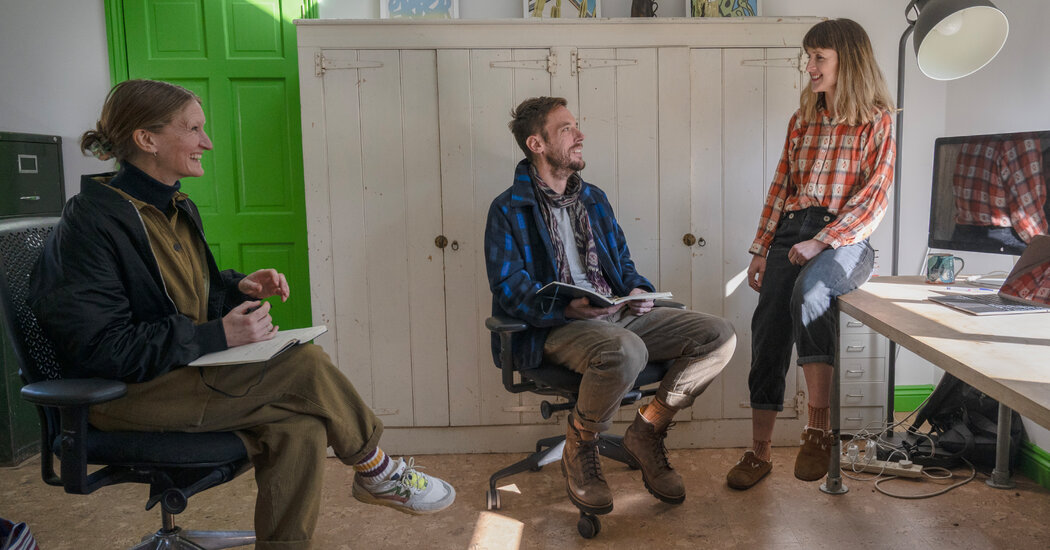The idea of making his older child a smartphone had been feeling inevitable for some time, Daisy Greenwell said. But at the beginning of last year, when her daughter was 8 years old, she filled her with terror. When he spoke to other parents, “Everyone said universally:” Yes, it’s a nightmare, but you didn’t choose, “said Mrs. Greenwell, 41.
He decided to test him. A friend, Clare Fernyhough, had shared his concerns about the qualities of addiction to smartphones and on the impact of social media on mental health, therefore they created a WhatsApp group to be strategizing. So Mrs. Greenwell, who lives in rural suffolk, in the East of England, has published her thoughts on Instagram.
“And if we could change the social rule so that in our school, in our city, in our country, it was a strange choice to make to give your child a smartphone to 11 years,” he wrote. “What if we could hold back until they are 14 or 16 years old?” He added a link to the WhatsApp group.
The post became viral. Within 24 hours the group has been signed in excess with the parents who loudly ask to join. Today, over 124,000 parents of children in over 13,000 British schools have signed a pact created by childhood without smartphones, by the beneficial organization established by Mrs. Greenwell, her husband, Joe Ryrie and Mrs. Fernyhough. We read: “By acting in the best interest of my son and our community, I will wait at least until the end of the 9th year before I procure a smartphone”. (The year 9 is equivalent to the eighth American degree.)
The movement aligns with a wider change of attitudes in Great Britain, since the evidence increases the damage to the development of the brain from addiction to smartphones and social media algorithm. In a survey of last year, most of the interviewees – 69 percent – considered social media to negatively influence children under the age of 15. Almost half of the parents said they fought to limit the time spent to children.
In the meantime, the police and intelligence services have felt a stream of extreme and violent content that reach children online, a trend examined in the successful adolescence TV show, in which a schoolgirl is accused of murder after being exposed to online misogyny. He became the most watched show of Great Britain and on Monday Prime Minister Keir Starmer met his creators in Downing Street, telling them that he had seen him with his son and daughter. But he also said: “This is not a challenge for which politicians can simply legislate”.
Other governments in Europe have acted to curb the use of the smartphone for children. In February, Denmark announced its intention to prohibit smartphones in schools, while France prohibited smartphones in elementary schools in 2018. Norway has planned to impose a minimum age on social media.
So far the British government has seemed wary of the intervention. Josh Macalister, a Labor legislator, attempted to introduce a legal requirement to make all schools in England free of charge. But the bill was watered down after the government clarified that it would not have claimed a ban, claiming that the principals should make the decision.
Some parents believe that the need to act is urgent, especially since technological societies, including Meta, which have Facebook and Instagram and X, previously Twitter, have put an end to the facts of control of the facts, which many experts claim that they will allow to flourish with disinformation and hatred.
“We have no years because things change,” said Vicky Allen, 46 years old, Henfield’s mother in southern England. “It seems that we should be.”
She and a friend, Julia Cassidy, 46, made a campaign for the elementary school of their children to limit the use of the phone after Mrs. Cassidy saw a Channel 4 documentary on smartphones in schools and then came across childhood without a smartphone. Mrs. Cassidy would give her son a phone when she turned 11, but said: “I just made a very large inversion.” Now, he plans to give him a phone that can only be used for calls and messages.
The power of the parents who collectively delays smartphones is the key, said Mrs. Greenwell, because it isolates children from the pressure of peers. “This problem is not so complicated,” he said. “If you have other people around you who are also doing the same thing, it is actually surprisingly, wonderfully simple.”
“Most people just want to keep their children safe”
A recent Friday morning, dozens of parents gathered in the Auditorium of the Colale Primary School in northern London for a presentation by Nova Eden, regional leader for childhood without smartphones.
Described data-that the middle year old middle Britain spent 21 hours a week on a smartphone, for example, and that 76 % of 12-15 years spend most of their free time on screens. He also spoke of the emerging research on the impact of the use of smartphones.
Mrs. Eden cited studies showing rates of anxiety, depression and self -harm among teenagers who disappear drastically since social media were introduced. “These children are fighting and need our help,” said Mrs. Eden. “I know how difficult it is, but we must be the ones who get up and say, this is not good for you.”
Mrs. Eden, 44, described a struggle to find the right balance for her children, 5, 10 and 13 years old. He said it was the campaign of Ian Russell, whose daughter Molly took her life after seeing content related to suicide on Instagram and other social media sites, which pushed her to be involved. He had just given a phone to his 13 year old.
“At that time, I was crossing this son and seeing the change in him and his friends,” he said.
Jane Palmer, principal of Colindale School, recognized that some parents were skeptical on the limit the use of smartphones or in completely banning the school devices, as will do his school from September.
Some argue that devices can provide social independence and allow them to contact their children in the event of an emergency. Others feel that parents’ controls go far enough to ensure online safety.
But the conversations between the parents had started to make room for change, said Mrs. Palmer. During the presentation, he described how a former student had died of suicide after being a victim of online bullying.
“It can be complicated and, of course, not everyone will support him,” he said of the ban. “But in the end, I think most people just want to protect their children.”
Colindale is in the Barnet district, which in February announced its intention to become the first district in Great Britain to ban smartphones in all its public schools. The initiative will affect about 63,000 children.
Eton, one of the most elite British private schools, announced last year that the new students would have been prohibited from bringing smartphones and would instead be issued with Nokia phones that can only text messages and make calls.
In Suffolk, the founders of the free childhood initiative for smartphones are aware that their success in capturing parents to their cause is partly thanks to the social media and messaging apps on which they disappeared the rumor.
“There are a lot of positive things about this technology,” said Ryrie. “We are not trying to say that the technology is bad, only that we must have a conversation as a company on when it is appropriate that children have unlimited access to these things.”





